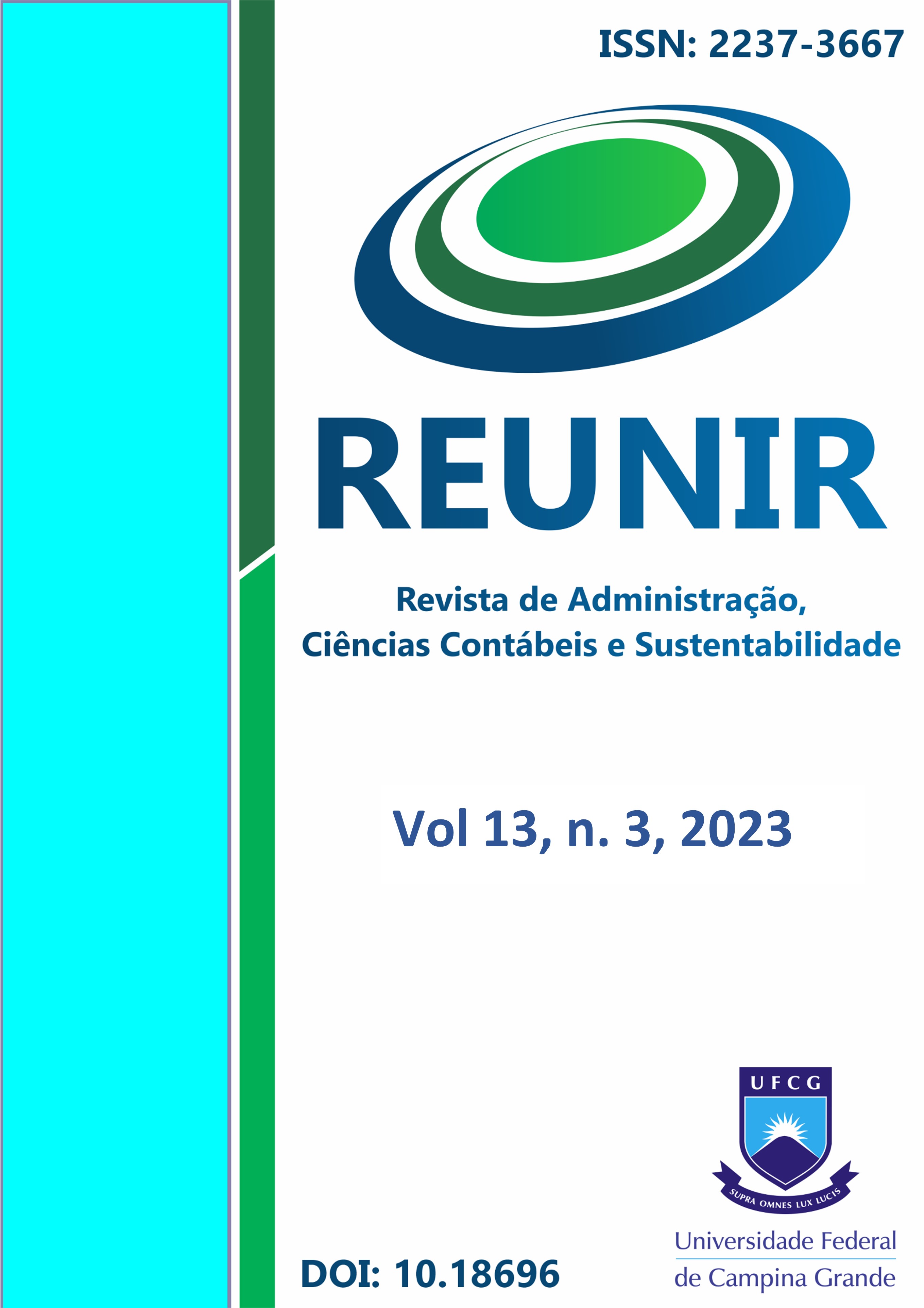Estratégias de comunicação de green marketing direcionadas à logística reversa
DOI:
https://doi.org/10.18696/reunir.v13i3.1197Keywords:
Green marketing, sustentabilidade, logística reversa.Abstract
Os impactos no meio ambiente resultantes dos processos da cadeia produtiva, assim como os efeitos que essas ações já ocasionaram e seus potenciais efeitos futuros, têm gerado uma crescente discussão quanto à temática ambiental. Nesse contexto, o interesse dos gestores pela prática da logística reversa e o marketing verde (green marketing) são crescentes visto o endurecimento das legislações ambientais, a pressão dos consumidores e os benefícios para a imagem organizacional. A informação voltada aos integrantes da cadeia produtiva, especialmente aos consumidores finais, é um dos elementos fundamentais de qualquer iniciativa na área de logística reversa. Nesse contexto, o desafio dos gestores tanto é desenvolver e implementar sistemas de logística reversa, bem como comunicar, incentivar e instruir seus clientes a aderirem a esse sistema, ou seja, fazerem uso do green marketing. Diante deste cenário, surge um problema de pesquisa: “Quais são as estratégias de comunicação de green marketing utilizadas pelas empresas para incentivar e instruir seus consumidores a contribuírem com a logística reversa?” Assim, o objetivo deste trabalho foi elencar as estratégias de comunicação de green marketing utilizadas pelas empresas para incentivar e instruir seus consumidores a contribuírem com a logística reversa.
Downloads
References
Alberti, R., Nara, E., Furtado, J., Kipper, L., & Siluk, J. (2014). Índice de processibilidade para tomada de decisão como apoio ao planejamento estratégico. Revista Eletrônica de Estratégia e Negócios. 7(2), 192-220.
Ajzen, I., & Fishbein, M. (1980). Understanding Attitudes and Predicting Social Behavior. Englewood Cliffs, NJ: Prentice-Hall.
Basu, R. J., Bai, R., Palaniappan, P. L. K. (2015) A strategic approach to improve sustainability in transportation service procurement. Transportation Research Part E: Logistics and Transportation Review, (74), 152-168.
Belch, G. E., & Belch, M. A. (2008). Propaganda e promoção: uma perspectiva da comunicação integrada de marketing. (7a ed.). São Paulo: McGraw-Hill, 2008.
Brasil, Lei 12.305 de 2 ago. de 2010. (2010). Política nacional de resíduos sólidos. Brasília, DF.
Budijati, S. M., Subagyo, Wibisono, M. A., & Masruroh, N. A., (2016). Influence of government and economic drivers on consumers’ intentions to participate in a take back program. International Journal of Logistics Systems and Management. 23(3), 343–362.
Castenow, D. (1993). New marketing in der praxis. Dusseldorf, Germany: ECON Executive Verlags.
Chen, Y., & Chen, T. (2019) Fair sharing and eco-efficiency in green responsibility and green marketing policy. International Journal of Production Economics. (217), 232–245.
Chou, S. Horng, J., Liu, C., & Lin, J. (2020). Identifying the critical factors of customer behavior: An integration perspective of marketing strategy and components of atitudes. Journal of Retailing and Consumer Services. (55), 102-113.
Correa, R. (2017). Comunicação integrada de marketing: uma visão global. Editora Saraiva: São Paulo, 325.
Crescitelli, E., & Shimp, T. A. (2012). Comunicação de marketing: integrando propaganda, promoção e outras formas de divulgação. São Paulo: Cengage Learning.
Dangelico, R., & Vocalelli, D. (2017) “Green Marketing”: An analysis of definitions, strategy steps, and tools through a systematic review of the literature. Journal of Cleaner Production. (165), 1263-1279.
Demajorovic, J., Augusto, E., & Souza, M. (2016) Reverse logistics of e-waste in developing countries: challenges and prospects for the Brazilian model. Ambiente & Sociedade. 19(2), 117-136.
Engelage, E., Borgert, A., & Souza, M. A. (2016). Práticas de Green Logistic: Uma Abordagem Teórica sobre o Tema. Revista de Gestão Ambiental e Sustentabilidade, 5(3), 36-54.
Gil, A. C. (2002). Como elaborar projetos de pesquisa. São Paulo: Atlas.
Govindan, K., Soleimani, H., & Kannan, D. (2015). Reverse logistics and closed-loop supply chain: A comprehensive review to explore the future. European Journal of Operational Research. 240(3), 603–626.
Gonçalves, P. V. (2019). Logística reversa de pneus inservíveis: diagnóstico situacional com aplicação de matriz de indicadores de sustentabilidade nos municípios de Belém e Ananindeua, Pará. Navus - Revista de Gestão e Tecnologia. 9(1), 165-181.
Huscroft, J., Hazen, B., Hall, D., & Skipper, J., (2013). HANNA, J. Reverse logistics: past research, current management issues, and future directions. The International Journal of Logistics Management. 24(3), 304-327.
Karmugilan. K., & Pachayappan, M. (2020). Sustainable manufacturing with green environment. Materials Today: Proceedings. (22), 1878-1884.
Khan, F., Ahmed, W., & Najmi, A. (2019). Understanding consumers’ behavior intentions towards dealing with the plastic waste: Perspective of a developing country. Resources, Conservation & Recycling. (142), 49–58.
Kotler, P., & Keller, K. (2006). Administração de Marketing. (12a ed.). São Paulo, Pearson Prentice Hall.
Lee, C., & Lam, J. (2012). Managing reverse logistics to enhance sustainability of industrial marketing. Industrial Marketing Management. 41, p. 589–598, 2012.
Leite, P. R. (2003). Logística Reversa: Meio Ambiente e Competitividade. (1a ed.) São Paulo, Prentice Hall.
Maruyama, U., Quintanilha, M.V.B., Silva, C. M. D., & Sanchez, P. M. (2019) Sustainability and green marketing challenge: brazilian brewing industry case study. Brazilian Journal of Operations & Production Management. 16(1), 78-87.
Mele, P., Molina, J., Garay, L., (2019). To green or not to green: the influence of green marketing on consumer behaviour in the hotel industry. Sustainability, 11(17), 4623.
Milfont, T. L. (2012). The interplay between knowledge, perceived efficacy, and concern about global warming and climate change: A one-year longitudinal study. Risk Analysis, (32), 1003–1020.
Mimouni, F., Abouabdellah, A., & Abouabdellah, A. (2016). Proposition of a modeling and an analysis methodology of integrated reverse logistics chain in the direct chain. Journal of Industrial Engineering and Management, 9(2), 359-373.
Pohlen, T. L., Farris, M.T., (1992). Reverse logistics in plastics recycling. International Journal of Physical Distribution & Logistics Management. 22(7), 35-47.
Prusa, P., Sadílek, T. (2019). Green Consumer Behavior: The Case of Czech Consumers of Generation Y. Social Marketing Quarterly. 25(4), 243-255.
Prusa, P. (2007). Corporate social responsibility. How can corporate responsibility be assessed. Working Papers, (9), 30-29.
Polonsky, M. (1994). An Introduction To Green Marketing. Electronic Green Journal, 1(2), 10-20.
Ribeiro, R. B., Santos, E. L. (2012). Análise das Práticas Estratégicas da Logística Verde no Gerenciamento da Cadeia de Suprimentos. Revista de Administração da Fatea, 5(5), 20-40.
Samson, J., Berteaux, D., Mcgill, J. B., Humphries, M. (2011). Geographic disparities and moral hazards in the predicted impacts of climate change on human populations. Global Ecology and Biogeography, 20(4), 1-13.
Seroka-Stolka, O. (2014). The development of green logistics for implementation sustainable development strategy in companies. Procedia - Social and Behavioral Sciences. 151, 302-309.
Sharma, A., Iyer, G., Mehrotra, A., Krishnan, R. (2010). Sustainability and business-to-business marketing: A framework and implications. Industrial Marketing Management. 39, 330–341.
Valle, P. O. D., Rebelo, E., Reis, E., Menezes, J., (2005). Combining behavioral theories to predict recycling involvement. Environment and Behavior. 37(3), 364–396.
Vasconcelos, I. F. F.; Alves, M.A.; Pesqueux, Y. (2012). logística reversa: como as empresas comunicam o descarte de baterias e celulares? RAE-Revista de Administração de Empresas. 52(2); 165-178.
Zaiem, I. (2005). Le Comportement Ecologique Du Consommateur, La Revue Des Sciences De Gestion, 4(214-215), 75-88.
Downloads
Published
How to Cite
Issue
Section
License
Copyright (c) 2024 REUNIR Revista de Administração Contabilidade e Sustentabilidade

This work is licensed under a Creative Commons Attribution-NonCommercial 4.0 International License.
Declaração de Direito Autoral
Direitos Autorais para artigos publicados nesta revista são do autor, com direitos de primeira publicação para a revista. Em virtude de ser um periódico de acesso público, os artigos são de uso gratuito, com atribuições próprias, em aplicações educacionais e não-comerciais, com caráter científico.
A Revista REUNIR adota Licença Creative Commons Atribuição-Uso não-comercial 3.0 Brasil License ou seu equivalente.







